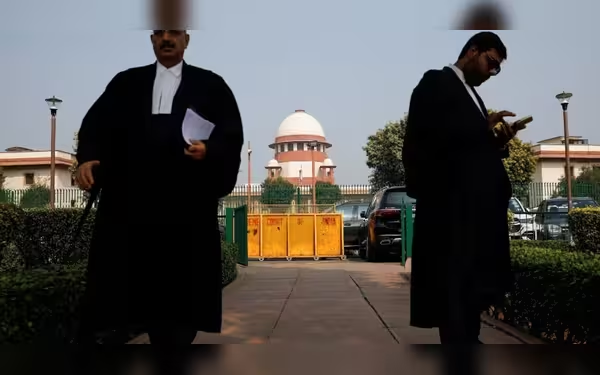Saturday, October 5, 2024 05:32 AM
Delhi Lawyers Seek Relief from Traditional Court Attire
- High Courts allowing lawyers to opt out of customary attire in summer.
- Supreme Court urged to enforce relaxation of dress code nationwide.
- Legal professionals facing challenges due to lack of cooling facilities.
 Image Credits: tribune_pk
Image Credits: tribune_pkThe scorching heat in New Delhi prompts lawyers to seek relief from traditional court attire, highlighting challenges faced by legal professionals and the need for a more practical approach.
India's capital, New Delhi, is currently grappling with severe heatwaves, posing challenges to the traditional attire worn by lawyers in courtrooms. Dating back to 1961, a law mandates lawyers to don heavy black robes and coats, a practice now being reconsidered due to the scorching temperatures.
As temperatures soar, some High Courts have permitted lawyers to opt out of the customary attire for the summer months. However, there is a growing call for the Supreme Court to enforce this relaxation nationwide. The lack of adequate cooling systems and water supply in certain courts has resulted in the postponement of cases, shedding light on the insufficient infrastructure in many legal settings.
With the mercury touching 50 degrees Celsius in New Delhi, authorities have implemented various measures to combat the heat, including water rationing, school closures, and setting up heatstroke units in hospitals. Tragically, a laborer recently lost his life to heatstroke, underscoring the gravity of the situation. The Meteorological Department has forecasted an increase in the number of heatwave days this month, further compounding the challenges faced by the public and the legal system.
In courts like the consumer court in Dwarka, judges are presiding over cases without proper cooling facilities, creating unbearable conditions for both legal professionals and litigants. The absence of basic amenities such as air conditioning and adequate water supply has led judges to adjourn cases until more favorable conditions prevail, typically in November.
A lawyer in Delhi has taken the initiative to petition the Supreme Court to reconsider the outdated dress code, citing health risks associated with the heat-absorbing black coats. The plea underscores the necessity for a more practical and sensible approach to attire for legal professionals.
The ongoing heatwaves in India's capital have not only impacted the general public but have also exposed the vulnerabilities within the legal system. As the country grapples with rising temperatures, it becomes imperative for authorities to address the challenges faced by legal professionals and ensure a conducive environment for the dispensation of justice.













